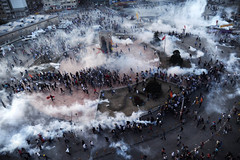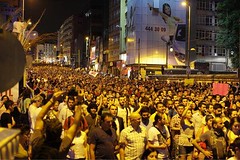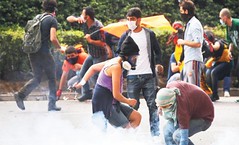Turkish Demagogue By Padraic Rohan
Turkish Demagogue
As Turkey's prime minister rallies his supporters against unprecedented defiance to his rule, he risks taking his country over a cliff. But it isn't enough for his opponents to rail against this demagogue – they must address the conditions which created him.
In late May a peaceful protest over the redevelopment of Gezi Park, a green area adjacent to Istanbul's Taksim square, was broken up by police spraying tear gas at point-blank range and burning the protesters' tents. Over the next few days, outraged crowds joined the protests, which quickly spread to other cities. The police clamped down further, sending armored carriers with water cannon and tear gas against the protesters; and the centers of Ankara and Istanbul came to resemble a war zone. At least four people died and thousands were injured. The government refused to allow media coverage of the unfolding carnage; Turkish television ran cooking and nature programs while facebook and twitter became the main source of news.
A student in his mid-twenties told me that the government's response has forced him to start questioning everything. “What if this had happened in the days before the internet? What else have they been keeping from us all these years, especially in the southeast?”
Protesters retook Gezi park, setting up another camp, with a first-aid clinic, library, cleaning crews, and kitchen. Thousands slept in the park, communists and nationalists, radical youth and fed-up middle classes, Kurdish activists and Kemalists; and a festive and euphoric atmosphere prevailed. For a week dozens of barricades blocked the approaches to Taksim, Istanbul's main hub for shopping and nightlife. Scorched shells of city buses and overturned police vans littered the square, and massive banners hung from surrounding buildings: “Tayyip resign”; “The Students Have Risen Up”; “Revolution is the Only Way”; “Socialism or Death”; “Tayyip Shut Up”.
“Tayyip” is Recep Tayyip Erdogan, prime minister for a decade, having led his socially conservative Justice and Development party (AKP) to three straight election victories. They govern without coalition, and many observers say that success has gone to Erdogan's head. Resentment against him has been mounting for years, and finally exploded here in response to police brutality. He dismissed the protesters as terrorists and riff-raff, and soon cleared the park again with tear gas, acid-laced water cannon, and percussion bombs. Doctors treating injured protesters, lawyers protesting against police brutality and human rights violations, and journalists documenting the protests were arrested.
The protesters have the moral high ground, and have been casting themselves as democrats versus fascists, as modernizers versus reactionaries, as secular defenders of Ataturk's republic versus Islamic fundamentalists bent on overthrowing it. But there are flaws in these interpretations. This is much more complicated than a straightforward case of good versus bad, and a close study forces us to question our assumptions about secularism and democracy, about Islam and modernity.
Rumor and conspiracy theory grow madly like thorny bramble in the no-man's-land between Erdogan's supporters and detractors. Casual anti-Semitism is distressingly common on both sides; many people told me that Erdogan had always enjoyed US support because of a Jewish plot, and others told me that Israel had instructed the US to stir up the protests. The protesters accused the police of using agent orange nerve gas, and many Turks are convinced that Erdogan is a British or American spy. In May, two car bombs killed fifty-two people in Reyhanli, a Turkish town near the Syrian border; and while the protesters were occupying Gezi park, one prominent sign accused the AKP itself of carrying out these attacks on orders from the Obama administration. This may be lunatic, but it is unfortunately not fringe. If we are to attempt to understand what is happening in Turkey, we must go into the back story.
As the Ottoman empire expired, it was the express intention of Britain, France, Greece, and Italy to carve Turkey up like a Thanksgiving bird. The British navy was moored in Istanbul, the French were coming up from Syria, the Italians occupied Antalya on the Mediterranean coast, and the Greeks landed in Izmir on the Aegean coast, pushing deep into Anatolia. Mustafa Kemal, later Ataturk, assembled an army and ejected the occupiers. Though this happened almost a century ago and is ancient history to westerners, the people of this land remember. The suspicion that foreigners are trying to undermine Turkey persists to this day, and animates Turkish politics in a way difficult for westerners to grasp.
The day after Gezi park was cleared, in a speech before hundreds of thousands of his supporters in Istanbul, Erdogan accused foreign agents of stirring up the protests, and seemed to revel in foreign criticism of his clampdown. By portraying himself as a defender of Turkey against meddling foreigners, he played on supporters' xenophobia. I spoke with two Turks after the speech, two professional women who don't wear the headscarf. They ridiculed Erdogan's claims that protesters were terrorists who had drunk beer and worn shoes in mosques, but they respected his harsh words towards Europe.
“He's crazy,” one of them said. “But sometimes he has a point. The European Union really has been hypocritical in its dealings with us.”
“He's the first leader since Ataturk to dare to speak to the west in this way,” the other said.
Erdogan's case is strengthened by tangible and unprecedented progress during his term: an economic boom which has lifted living standards in Anatolia to a level never seen in living memory; the assertion of civilian control over the military; and guarantees of Kurdish rights and subsequent negotiations with the Kurdistan Workers' Party (PKK). Until a ceasefire agreed this year, the government had fought separatist Kurdish guerrillas in the southeast of Turkey, in a war that has killed forty thousand people over the past three decades.
But these gains are fragile and easily undone. Erdogan is now playing with the fire of religious bigotry, and his repeated fulminations against the protesters and “the interest-rate lobby” (no Turk could fail to catch the Jewish reference) plotting against Turkey may benefit him in the short term, but will eventually backfire with disastrous consequences. Peace talks with the PKK are at a delicate stage, and the unrest has hurt the economy. Most important, Erdogan's taming of the military, though necessary, removed the traditional guarantor of secularism and left a dangerous vacuum.
In the ongoing Ergenekon trials, hundreds of military officers are accused of plotting to overthrow the AKP; and though the evidence against many officers is strong, most officers appear to have been charged on insufficient or fabricated evidence. Article 301 and dozens of other similar statutes outlaw any insult to the government, the military, or the nation; once used by Kemalists to persecute their enemies, they are now used by Erdogan and the AKP. More journalists are imprisoned in Turkey than in any other country, and thousands more are locked up on flimsy terror charges. Turkey desperately needs a new constitution to lock in minority rights, protect free speech, and establish judicial independence.
For years, many critics have said that Erdogan has an Islamic agenda to undermine Ataturk's secular republic and take Turkey the way of Iran. Alcohol restrictions have come into effect, and restrictions on the headscarf have been repealed. Before AKP rule, a woman who wore the headscarf either didn't attend university, or removed her scarf at the gates of the university, or wore a wig; but in 2008 parliament overturned the headscarf ban at public universities.
An uneasy tension between secularism and democracy has characterized modern Turkey. The secular state that Mustafa Kemal Ataturk founded was not democratic in the slightest; had it been, his wrenching social reforms could never have been implemented. The Arabic alphabet was abandoned for the Roman, the religious hierarchy lost its control of education, and women gained full political rights. In contrast to this liberal secular agenda, democracy here has consistently had a very socially conservative hue. Turkey's first democratically elected prime minister, Adnan Menderes, campaigned in 1950 on a promise to restore the Arabic call to prayer to all Turkish mosques, and reopened thousands of mosques that had earlier been shut down. After a decade in office, he was hanged for violating the secular constitution.
This was the first of several coups in which the military overthrew democratically elected governments to protect secularism and ensure stability. The Kemalist elite never deigned to formulate a coherent democratic alternative, relying on the military to check a socially conservative populism. State institutions remained weak, and deep divisions within Turkish society grew acute. The so-called White Turks, the old Kemalist urban elite, looked down on the Black Turks from deep Anatolia, who had traditionally been marginalized but who now came to form the most powerful voting bloc.
This is the source of the strength of the ruling party, but a feeble and fragmented opposition have handed the AKP yet more power. Erdogan has nothing to fear from them, and he would likely be less megalomaniacal if his opponents were able to push the AKP into coalition. Far from harnessing the outrage of the protesters, the leader of the Nationalist party claimed that Kurdish terrorists were behind the Gezi protests. The leader of the Kemalist opposition enjoys only lukewarm support within his own party, and is widely despised among the protesters. His party's democratic credentials are flimsy at best, and his reaction to the protests has been meandering and disingenuous. At first calling for Erdogan's resignation, he then told his people to stay out of the protests, and then lauded the protesters in an open letter to Angela Merkel, the German chancellor, complaining that democracy, human rights, and freedom have all regressed under AKP rule.
The police have indeed brutalized protesters, and some resignations and prosecutions are in order; yet this brutality cannot compare with the horrifying abuses of the recent past. In the 1990s, thousands of Kurds disappeared while in police custody, their bodies never found. Extra-judicial killings by the police, the military, and right-wing paramilitary groups were carried out with impunity. Murky connections between the government, security services, and organized crime were exposed in the Susurluk scandal of 1996, in which a car crashed carrying the deputy police chief of Istanbul, a Kurdish member of parliament and chief of an anti-PKK militia, a contract killer and drug smuggler on Interpol's wanted list, and a former beauty queen. You can't make this stuff up, and Turkish conspiracy theorists might be forgiven their exuberance.
Erdogan's incendiary rhetoric is further polarizing Turkish society, and hard-won gains made under his leadership could easily be lost. Hatred of Erdogan and all he stands for is uniting many protesters for now, but it is unlikely that the opposition on the streets and in parliament will be able to force the AKP into coalition in the next election. Many in the opposition look back wistfully to a past that never happened, while underestimating Erdogan's strength in Anatolia and the hard compromises that must be made.
More democracy is indeed part of the answer: Turkish parties must now reach a ten-percent threshold to enter parliament, a higher bar than that imposed by Russia. But other important reforms would constitute checks upon democracy. An independent judiciary, guarantees of free speech, and the protection of minority rights are essential checks upon the fickle will of the majority and upon those leaders who play on their hopes and fears. Demagogues throughout history have run their societies to ruin – in the Peloponnesian War, in the Roman Republic, in the French and Russian revolutions, and in Nazi Germany. The danger is clear, and it is for the voices of reason, both within the ruling party and among the opposition, to prevent an escalation, lock in the progress Turkey has made, and lay the foundation for a pluralist Turkey.



